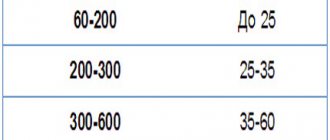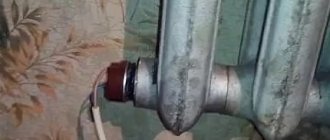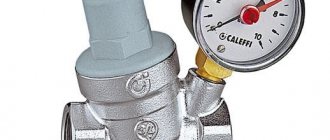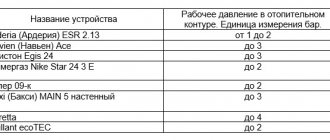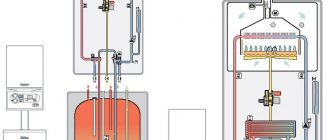How does a boiler work?
To understand the situation more clearly, you need to understand the principle of operation of the boiler. Double-circuit gas wall-mounted boilers such as Baksi or Ariston consist of several components. In the gas part, the incoming fuel is burned, the water part ensures the supply of heated water from the heat exchangers to the heating system, and the smoke removal part is responsible for removing combustion products outside the home.
Depending on the user settings, temperature sensors adjust the water heating mode. A sensor on the return pipeline turns off the boiler, depending on the achievement of the required temperature set for the return. However, the system pump does not stop running until the heat exchanger temperature drops.
This is provided to prevent the water from boiling in it. As soon as the coolant cools down to the maximum level, the electronics will send a signal to turn on water pumping and the gas valve. The whole process will start again. When you open the tap in the mixer in a double-circuit boiler, a flow sensor reacts, which informs the electronics about the need to switch the three-way valve to the mode of heating water for DHW.
When the hot water tap is turned off, it returns to heating mode. Some manufacturers provide heating for both heat exchangers during periodic switching.
Causes of poor heating and methods for eliminating them
Let's consider what are the reasons why a gas boiler does not gain temperature.
The coolant temperature is incorrectly set
First you need to set the temperature on the unit correctly. This indicator may differ for different boiler models. Usually the maximum and minimum values are indicated in the instructions. Most boilers have a maximum temperature of 80ºC or 85ºC, but experts recommend setting it to no more than 60ºC. Since at high rates the water gets very hot, and scale begins to appear. Deposits cover the walls of the circuit, and its heat transfer deteriorates. This leads to the heat exchanger overheating, and the liquid does not have time to heat up enough. As a result, the heating system does not provide the optimal temperature. This problem can be solved by cleaning the heat exchanger from scale.
In modern models, the heating level of the coolant can be set not only by a person, but also by an outside temperature sensor. Depending on weather conditions, it automatically regulates the heating of the liquid in the circuit. If you have this device, adjust the temperature on it.
The power of the unit is incorrectly selected
When choosing a gas boiler, attention should be paid to determining the required power. If it is less or more than needed, this will lead to poor heating quality. If there is insufficient power, the unit will operate at maximum, but there will still not be enough heat.
If a gas boiler has too high a capacity, then a problem such as the unit’s clocking often arises: the gas boiler quickly gains temperature and turns off, and then turns on again after a few minutes. The room warms up poorly in this mode of operation.
This problem can be solved in several ways:
- inclusion of additional radiators in the system;
- unit settings change;
- replace the boiler with a less powerful option.
Burner not adjusted correctly
The reason that the gas boiler does not reach temperature may be improper regulation of the burner flame. In this case, the temperature usually does not exceed 50-60ºC. In this case, it is necessary to increase the flame strength using the burner regulator. To do this you will have to remove the boiler body.
Note! When adjusting the flame, you should monitor the main settings indications. You may need to increase or decrease the flame further.
Low coolant velocity
The reason for the lack of heat may be a decrease in the speed of movement of the coolant through the system. This may happen if:
- Leaks in radiators or pipes. You should first check all connections and joints. If a leak is found, it must be sealed. After this, coolant should be added to the system.
- Incorrect pump adjustment. Circulation pumps usually have a speed controller. To speed up the movement of the coolant, switch the pump to higher speed.
- Closed shut-off valves. You need to make sure that all radiators have a good supply of water.
- Airing the system. Trapped air delays the circulation of coolant in the system. To eliminate it, Mayevsky taps are used, they are opened and excess air is released from the batteries.
Automation malfunctions
Faulty temperature sensors can lead to insufficient heating of the boiler. One of them may send a false signal about the set temperature indicator, as a result of which the boiler will turn off.
The boiler does not heat water for heating
So, let's look at the main reasons why a gas boiler does not heat water for the heating system and what to do about it:
- airlock. It is necessary to inspect the heating system for the presence of air in the radiators. To eliminate this problem, you need to install an air vent. Its operating principle is similar to that of an expansion tank, but it is capable of maintaining pressure in the system. Using an air vent, you need to bleed air from the system. It is important to inspect the valve itself for mechanical blockages - scale may be present there;
- corrosion in radiators. Clogging of heating devices can be determined by draining water from the system. If the water flows dirty, then you need to flush the system until visually clean water appears;
- connection errors. Hot water may not flow if the diameter of the pipes is not as specified in the project or instructions. It is necessary to check the compliance of the pipeline, the correct connection and the quality of installation of shut-off valves;
- insufficient pressure in the network. You should try adding water to the heating system, as there may not be enough pressure to trigger the automatic ignition of the burner;
- presence of scale in the heat exchanger. The first sign is prolonged heating of the coolant and heating of the batteries. It is necessary to get rid of sediments and carry out boiler water treatment. To do this, you need to disassemble the boiler and remove the heat exchanger assembly.
Before doing this, you need to shut off the flow of gas and water to the device. Then flexible connectors from the pump are connected to the heat exchanger and it is washed with a composition containing a special cleaning agent, which can be purchased over the counter. After which the parts are washed with water.
Some manufacturers allow the use of antifreeze instead of water in the heating system. This substance can be used in the following boilers: “Baxi”, “Vaillant”, “Proterm”, “Beretta”, “Korea Star”. However, it should be understood that each manufacturer recommends using its own antifreeze;
- filter clogging. If the filter screens are clogged with mechanical debris, the radiators may also have poor heating. Therefore, the filter should be checked and cleaned regularly by rinsing with water. If clogging occurs too often, then such a part must be replaced;
- incorrect setting. First of all, if there is weak or no heating, you need to check the settings of the control unit. The temperature may be set insufficiently and the gas does not heat the water;
- malfunctions of pumping equipment. If the pump power is not enough to ensure good circulation, it may turn off if it overheats. This can happen when the DHW circuit is turned on;
- incorrectly selected heating devices. If the system has radiators with unsuitable heat transfer and design parameters, this can also lead to low heating;
- incorrect slope of pipelines. Most often this problem occurs in systems with natural circulation. Regulatory documentation specifies that the slope of pipes should be 10 mm per meter of pipe. If these requirements are not met, circulation may be disrupted and, as a result, there may be no heating due to low coolant flow.
Reasons for water overheating by a column
There are several reasons why a geyser overheats water:
- the heat exchanger is clogged;
- low water pressure;
- untimely filter replacement;
- regulators are installed incorrectly;
- low mixer capacity.
Most often, the cause of strong heating of water or the body of the boiler itself is a clogged heat exchanger. Overheating can also be a consequence of turning on the equipment when water pipes and heating pipes are blocked.
Mineral salts that settle on the walls impede the movement of the coolant. As a result, water flows more slowly through the heat exchanger, and heating is performed at normal intensity
To identify the true cause, it is first recommended to check the operation of the pump and the circulation of water through the heating system.
Low water pressure
If the water in the tap is either extremely hot or cold, the cause of such “swings” is poor pressure in the main line or a mismatch between the water pressure and the power of the dispenser. The throughput of brands such as Bosch, Ariston, Baltgaz, Nevalux, Electrolux, etc. is 11 l/min. With little pressure, overheating occurs.
You can solve this problem yourself. To do this, it is necessary to install a pump that can artificially increase the water pressure in the system. As a result, the temperature of the liquid will be reduced
To solve the problem with pressure, contact the city water utility.
Late filter replacement
The quality of tap water leaves much to be desired. To minimize its destructive effect on equipment, a mesh type filter is installed. It traps small debris, purifies water from impurities and softens it.
If the filter has not been changed for a long time, then water with magnesium and potassium salts gets into the column. As a result, scale deposits on the parts. This calcium deposit often causes equipment failure.
Regulators are installed incorrectly
Do you change the position of the regulator in a timely manner depending on seasonality? Often the reason for the strong heating of water by a gas water heater is the change of seasons. In spring, the water in the communications becomes warmer, and the gas supply regulator is set to the maximum value.
At the same time, the water supply regulator remains at the minimum level (as in winter). As a result, the water becomes too hot in summer.
Low mixer capacity
Another common problem is when the water temperature in the kitchen is comfortable, but boiling water is pouring from the shower.
It is not recommended to dilute the hot stream with cold one. This leads to faster scale formation. As a result, the equipment quickly fails
In this case, the problem is caused by the low flow capacity of the shower faucet. The only solution is to purchase a mixer with maximum throughput.
The boiler does not heat water for hot water supply
In addition to the lack of heating of the heating system, it happens that the gas boiler does not heat the hot water supply circuit.
After all, scale has a structure that limits the passage of coolant and also takes away its heat. This is due to the thermal conductivity of salt deposits - it is much lower than the thermal conductivity of the metal from which the heat exchanger is made. Therefore, the boiler does not heat hot water well.
It is also possible that a piece has come away from the salt deposit, blocking the flow completely, which leads to a complete stop in the supply of hot water.
Structurally, the sensor is a paddle device through which water flows, which is the condition for its operation, because it sends a signal about the presence of a flow to the electronics, which, in turn, starts heating the water again. It happens that the sensor gets clogged, but it can be cleared of the blockage without removing it.
The boiler is working but the radiators are cold
Cats don't sleep on cold radiators.
The efficiency of the entire heating system directly depends on the performance of the boiler. Malfunctions of the main heating equipment negatively affect the efficiency of the home heating circuit and lead to excessive energy consumption. That is why any breakdowns, even the most insignificant ones, are given special attention. People’s experiences are understandable if the boiler is working and the radiators are cold. After all, this not only reduces the level of comfort in the house, but also entails expensive repairs. To properly solve a problem, you need to understand its essence. Only a specialist can correctly determine the reasons why the boiler does not heat the batteries. Also read: “Why do radiators heat poorly?“.
Boiler malfunctions
Typical problems with the operation of heating equipment:
- malfunction of the built-in pump;
- the heat exchanger is clogged;
- The three-way valve does not work.
If the boiler is working and the radiators are cold, experts recommend, first of all, assessing the technical condition of the main heating element. More specifically, determine whether the circulation pump built into the device is working. This part is an invariable attribute of modern equipment and is designed to increase the efficiency of its operation. Very often, after a long period of inactivity in the summer, the pump can become clogged or become covered with a layer of limescale. As a result, it does not remove the heated coolant from the heat exchanger in a timely manner. The boiler is boiling, but the radiators are cold.
It is strictly prohibited to independently repair such complex equipment as a boiler. In this case, either a specialist from the service center or a repairman with the appropriate certificate or permit is called to your home.
Experts do not recommend using ordinary tap water as a coolant, as it is hard. When the coolant temperature increases, dissolved salts settle on the heat exchanger. As a result, the following problem arises: the boiler is working, but the radiators are barely warm. Scale reduces the thermal conductivity of the heat exchanger, so the water in the circuit does not heat up, although the heating element constantly works with excessive energy consumption. You can fix the problem by changing the coolant and cleaning the heat exchanger. This video will help you understand how to clean the heat exchanger correctly:
A double-circuit boiler heats water, but does not heat the radiators. Here you need to pay attention to the serviceability of the three-way electric valve. It is responsible for switching the bypass from heating circuit maintenance mode to DHW and CO mode.
Before making a heating register with your own hands, familiarize yourself with the technical base.
Why can't antifreeze be used for radiators? The answer is here.
More rare technical reasons why a gas boiler often turns on and off
Low pressure in the gas line
It's no secret that domestic gas pipelines may allow interruptions or a decrease in gas pressure. In the event of a failure, the burner simply goes out; in more expensive boilers, the automatic system extinguishes the flame as soon as it, due to the low gas supply pressure, drops to a critical level at which the burner may burn out. If the problem is temporary, this may be the issue.
There is also a possibility that the meter may break or become clogged, and it may produce a characteristic noise. If the measuring device is malfunctioning, contact a specialist; it is prohibited to carry out any work yourself.
Clogged or frozen chimney
Standard chimneys, in the absence of regular maintenance, are characterized by clogging with soot, dust from the street, and particles of construction waste. Lack of draft can lead to characteristic cyclical operation of the boiler; it is enough to clean the chimney yourself or contact the utility service.
Freezing of the coaxial (side) chimney can also limit the draft of turbocharged and atmospheric boilers. Combustion products in the form of vapors form condensate, which settles on the chimney. In severe frosts, above -15°C, this contributes to critical icing, which affects traction. If advanced models with a self-diagnosis function inform the owner with a corresponding error, then simpler models turn on cyclically and immediately turn off.
The solution is quite simple - knock off the icing and clean the chimney. To prevent the problem, it is worth installing a special anti-icing chimney design.
Backdraft
Occurs when the calculation of the height or cross-section of the chimney is incorrect. It also often happens during strong gusts of wind in boilers with a horizontal flue. When the flame is blown out by reverse draft, the gas control of the boiler turns off the burner for safety reasons, and then lights it again.
What to do if the gas boiler blows out in a strong wind
Voltage fluctuations or failures
An extreme reason for the malfunction of the boiler can be fluctuations or interruptions in the voltage supply (respectively, if the boiler is volatile). In the first case, in the absence of a voltage stabilizer, some models of gas boilers may interrupt operation and start again, if this is provided - the corresponding error is displayed on the screen.
A similar situation occurs during a short-term power failure, which is typical in our conditions and is not at all uncommon. The problem can be avoided by installing and connecting a UPS (uninterruptible power supply), which will be able to ensure the constant operation of the boiler for some time after the power supply is turned off.
| Guest |
| Good afternoon, please tell me, I’m asking for advice, I installed Ariston, before that it was Baksi. With the old boiler everything worked, now I installed Ariston28CF. The heating system is combined metal ppr. 2nd floor house standing system area 230-250 sq.m. Boiler installed 3rd floor attic space. When starting the system, 2nd floor is hot, 1st floor is a sharp boundary between hot and cold heating. Checked the air filter. We tried installing a more powerful additional pump after the boiler. Max temperature for faster warm-up. Warming up 2nd floor is normal, 1st floor very slowly until the middle of the device is already better. On the boiler, the temperature is stable at 79-80, constantly on, set to 65, quickly picks up the temperature, goes out to 22, and again the same thing. |
| Yuri Bely |
| Good afternoon. |
Problems with the heating circuit
The pump must be selected according to the requirements of the heating circuit.
Malfunctions in the operating mode of the heating circuit are not always associated with a malfunction of the main heating element. If the boiler works, but does not heat the batteries, the reason must be sought in the wiring itself.
List of main heating circuit malfunctions:
- the filter on the return line or the needle tap (Maevsky tap) is clogged;
- insufficient power of the circulation pump;
- the rules for installing a heating circuit with natural circulation have not been followed.
Any of the above problems must be resolved before the start of the heating season. Otherwise, the room may be left without heat for several days, since the repair involves completely draining the coolant.
So, why doesn’t the boiler heat the batteries if everything worked fine over the previous years? The reason is a dirt plug that has formed on the heating circuit filter and completely blocks the coolant flow. It can be solved simply - the water is drained from the pipes or its circulation is blocked using bypasses, and the filter is cleaned. To prevent a recurrence of such a situation, it is necessary to completely replace the coolant with parallel flushing of the entire circuit.
In a gravity system, the slope of the pipes is key.
The second reason why the boiler works but the radiators are cold is the insufficient power of the circulation pump. The performance of the device is not enough to pump the entire volume of coolant in a timely and efficient manner. Or the heating system in the house has branches that are located at a significant distance from the pump. As a result, the circulation pump overheats, the heating equipment operates with excessive energy consumption, and the radiators remain cold. The solution is to change the coolant pumping device to a more powerful one.
Why are the radiators cold when the boiler is running?
Low efficiency of the heating system can be the result of malfunctions of both the circuit itself and the main heating element. In the case of a heating device, it is necessary to pay attention to the three-way valve, the functionality of the pump and the technical condition of the heat exchanger. Typical problems for heating wiring are a clogged filter, insufficient power of the circulation pump and lack of slope of the pipes of the circuit with natural water circulation.
Source
Why does a gas boiler boil?
During normal operation of the equipment, the coolant in the circuit warms up to the set temperature. After which it is distributed naturally or forcibly through the heating system through the pump. This is how the radiators in the room warm up. The liquid then moves along the return circuit and returns to the boiler.
In case of overheating of the coolant, thermal sensors are activated. As a result, the operation of the device is blocked. What to do if the boiler boils? To restore heating, it is necessary to find the cause of the breakdown. Sometimes the self-diagnosis system displays an error code:
- E01 for Navien;
- E02 for Baxi;
- A03 for Corestar;
- 01 for Ariston;
- F20 for "Proterm";
- 16 for Rinnai, etc.
But if this does not happen, the problem can be identified by external signs.
What causes overheating:
- Clogged filters;
- Air accumulation;
- The heat exchanger is clogged with scale;
- Problems with the circulation pump;
- Failure to comply with regulations for the premises where the equipment is installed.
AOGV does not heat
#1 Dimka89
- Participant
- 767 messages
- 203 topics
- Registration: 11 Nov 2009
- Gender: Man
#2 Lacerta
- Registration: 21 Jun 2011
- Gender: Woman
- City: Kaluga
#3 Beautiful
- Registration: 13 Jan 2010
#4 Dimka89
#5 FICHER/1.
- Registration: 12 Oct 2007
- Gender: Man
- City: Kaluga.
Post edited by FICHER/1.: December 10, 2012 - 23:06
#6 Beautiful
- Registration: 13 Jan 2010
#7 Dimka89
Post edited by Dimka89: December 11, 2012 - 08:15
#8 Bart_Simpson
- Registration: 26 Apr 2004
- Gender: Man
- Sin City
caramba
#9 Beautiful
- Registration: 13 Jan 2010
#10 Dimka89
Post edited by Dimka89: December 11, 2012 - 21:00
#11 Beautiful
- Registration: 13 Jan 2010
I found out that such boilers do not operate under pressure from pumps, only by gravity
#12 Dimka89
#13 Beautiful
- Registration: 13 Jan 2010
#14 Dimka89
#15 Beautiful
- Registration: 13 Jan 2010
and this price included radiators, a double-circuit boiler and labor. and then at a minimum
A very common occurrence: they put together a system hastily, cut the dough, leaving the client without money and with a problem. The whole system cost me RUB 27,000, including the boiler, pipes, fittings, pump, radiators, extensions. tank, etc. I actually assembled it myself.
and the factory automation still works on it, I just read on the net that many people have the button held on by a string - it’s somehow dangerous.
#16 Dimka89
Post edited by Dimka89: 12 December 2012 - 12:33
#17 FICHER/1.
- Registration: 12 Oct 2007
- Gender: Man
- City: Kaluga.
The options are: 1. We missed the level in the tank, air got in (accumulates at the highest points).
3. Small pipe slopes, or small diameter + corrosion inside, or debris = increased resistance.
Installing the pump is not difficult. The biggest problem is draining the water from the system. If I were doing it for myself, I would wait until summer and calmly redo the entire system, replacing radiators, pipes, and installing a pump. Now it’s better to simply eliminate the cause of poor circulation, if possible.
It's a bullshit. My Zhukovsky boiler works with a pump, come and show me. The pump does not generate pressure. Pressure arises when the coolant heats up, which is compensated by the expansion tank.
Post edited by FICHER/1.: 12 December 2012 - 22:43
#18 FICHER/1.
- Registration: 12 Oct 2007
- Gender: Man
- City: Kaluga.
in general, I went there today - I drained the water from the tank - it started to get warmer, maybe the air was really normal, it seemed normal, installing a pump was not an option, I found out that such boilers do not work under the pressure of the pumps, they only flow by gravity, in short, I will collect money for approximately 70-90 thousand the system will need to be replaced. and there is also a hole at the top of the boiler, I was told for a thermometer, where can I get such a thermometer to know the temperature more accurately?
#19 Beautiful
- Registration: 13 Jan 2010
Young man, don’t talk nonsense...
#20 FICHER/1.
- Registration: 12 Oct 2007
- Gender: Man
- City: Kaluga.
Empty post, something is missing, don’t you think?
Post edited by FICHER/1.: 12 December 2012 - 23:47
#21 Beautiful
- Registration: 13 Jan 2010
Post edited by Beautiful: December 12, 2012 - 23:56
